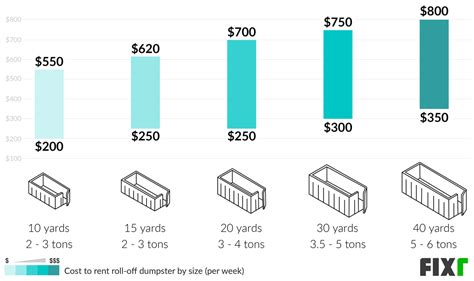How Much Does it Cost to Rent a Dumpster? A Comprehensive Guide
Renting a dumpster can seem straightforward, but the actual cost varies significantly depending on several factors. Understanding these factors will help you budget effectively and avoid unexpected expenses. This guide breaks down the key elements influencing dumpster rental prices and offers tips for saving money.
Factors Affecting Dumpster Rental Costs
Several factors contribute to the final price you'll pay for dumpster rental. Let's explore the most significant ones:
1. Dumpster Size: The Biggest Factor
The size of the dumpster is the most influential factor determining rental costs. Common sizes include:
- 10-yard dumpsters: Ideal for small clean-up projects like bathroom renovations or small deck demolitions.
- 20-yard dumpsters: Suitable for larger projects such as garage cleanouts, minor home renovations, or small roofing projects.
- 30-yard dumpsters: Appropriate for significant home renovations, larger demolition projects, or extensive landscaping work.
- 40-yard dumpsters: Best for very large projects like whole-house renovations, commercial construction, or major demolition jobs.
Larger dumpsters naturally cost more to rent due to increased transportation, material costs, and landfill fees.
2. Rental Duration: Time is Money
Dumpster rental companies typically charge by the day or week. The longer you need the dumpster, the higher the overall cost. Accurately estimating your project timeline is crucial to avoid overspending. Plan your project carefully and rent for the minimum necessary time.
3. Location: Distance Matters
Your location plays a role in the final price. Companies may charge more for rentals in areas further from their disposal sites or those with difficult access. Rural locations or areas requiring special permits might incur additional fees.
4. Waste Type: What You're Throwing Away
The type of waste you're disposing of can significantly impact the cost. Some materials, like hazardous waste (paint, chemicals, asbestos), require special handling and disposal, leading to substantially higher fees. Always clarify what materials are acceptable for disposal with your rental company. Improper disposal can lead to hefty penalties.
5. Delivery and Pickup Fees: Hidden Costs?
Delivery and pickup fees are common additions to the base rental price. These costs depend on distance and potentially the accessibility of your location. Inquire about these charges upfront to avoid surprises.
6. Permit Requirements: Local Regulations
Some localities require permits for dumpster placement on public property. Check with your local authorities to determine if you need a permit and factor in any associated costs.
Tips for Saving Money on Dumpster Rentals
- Compare Prices: Obtain quotes from multiple dumpster rental companies in your area before committing.
- Rent the Right Size: Avoid overestimating your needs; renting a dumpster that's too large is unnecessarily expensive.
- Optimize Your Timeline: Rent the dumpster only for the duration you truly need it.
- Check for Discounts: Some companies offer discounts for extended rentals or specific project types.
- Proper Waste Sorting: Sorting your waste can help reduce the overall disposal costs, especially if you separate recyclable materials.
Conclusion: Budgeting for Your Dumpster Rental
Renting a dumpster can be a cost-effective way to manage waste during home renovation or cleanup projects. However, understanding the factors that influence pricing allows for better budgeting and avoids unexpected expenses. By considering the size, rental duration, location, waste type, delivery/pickup fees, and any permit requirements, you can make an informed decision and rent the dumpster that best fits your needs and budget. Remember to always compare prices and ask clarifying questions before finalizing your rental agreement.
